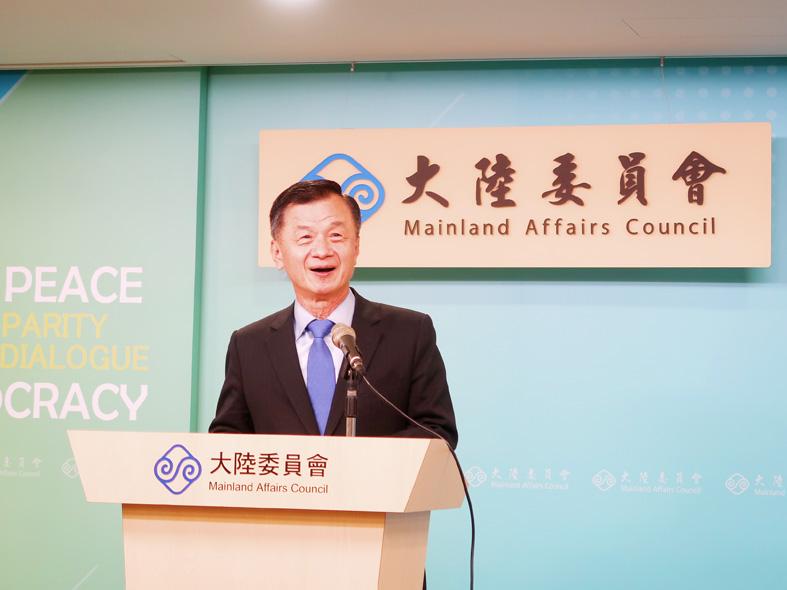Cross-strait relations can hopefully proceed with “constructive ambiguity,” given the right attitude from both sides, Mainland Affairs Council (MAC) Minister Chiu Tai-san (邱太三) said yesterday as he announced rules to allow business travelers from China to visit amid the COVID-19 pandemic.
If cross-strait exchanges must be founded on the premise that one side accepts the other’s framework, “then I think it is an unfair, unjust and unrealistic request,” Chiu told a news conference in Taipei.
Chiu was referring to Beijing’s insistence that Taipei accept its interpretation of the so-called “1992 consensus,” which it reiterated after he vowed to facilitate a thaw in cross-strait ties when he accepted the post last month.

Photo: Chen Yu-fu, Taipei Times
The “1992 consensus” — a term that former MAC chairman Su Chi (蘇起) in 2006 admitted making up in 2000 — refers to a tacit understanding between the Chinese Nationalist Party (KMT) and the Chinese Communist Party that both sides of the Taiwan Strait acknowledge there is “one China,” with each side having its own interpretation of what “China” means.
“I think the two sides can be more friendly and cooperative,” Chiu said. “There is no need to force yourself or others to enter into a set framework.”
“Finding the greatest common denominator” would benefit both sides and elicit the least controversy, he said.
However, whether the two could achieve constructive ambiguity “depends on the wisdom of both sides, and honestly, it also depends on their attitudes,” he said, referring to China.
It is thought to be the first time that a MAC minister has used the phrase “constructive ambiguity,” which has come to define US policy toward Taiwan since the time of former US secretary of state Henry Kissinger.
Addressing Beijing, Chiu made three requests: the cessation of military threats; pragmatic dialogue; and a reciprocal effort toward developing cross-strait exchanges.
He urged Beijing to understand that Taiwan’s systems and values are different from China’s, and to view the development of cross-strait ties in a positive light.
Underlining his intent, Chiu announced an end to a ban on Chinese business travelers after more than a year of COVID-19 travel restrictions.
Chinese businesspeople fulfilling contract obligations, as well as Chinese employed by multinationals slated for transfer, would be permitted entry upon approval by the Ministry of the Interior, he said.
The council made the decision in consultation with the Central Epidemic Command Center (CECC) and other agencies in a bid to facilitate cross-strait economic activity, he said.
Discussions are continuing on whether to resume travel for Chinese with family in Taiwan, as well as on border control adjustments, he said.
However, as the center does not yet list China as a medium-low or low-risk region, Chinese business travelers are not eligible for shortened quarantines, CECC spokesman Chuang Jen-hsiang (莊人祥) said.
Like other travelers, they must provide a negative polymerase chain reaction test conducted within three days of departure for Taiwan, and undergo 14 days of quarantine followed by seven days of self-health management, Chuang said.
Aside from business travelers, Chinese nationals with Taiwanese residency, as well as their spouses and children, can enter Taiwan, in addition to students, and those with imperative family or health reasons.
Additional reporting by CNA

The Taiwanese passport ranked 33rd in a global listing of passports by convenience this month, rising three places from last month’s ranking, but matching its position in January last year. The Henley Passport Index, an international ranking of passports by the number of designations its holder can travel to without a visa, showed that the Taiwan passport enables holders to travel to 139 countries and territories without a visa. Singapore’s passport was ranked the most powerful with visa-free access to 192 destinations out of 227, according to the index published on Tuesday by UK-based migration investment consultancy firm Henley and Partners. Japan’s and

NATIONAL SECURITY THREAT: An official said that Guan Guan’s comments had gone beyond the threshold of free speech, as she advocated for the destruction of the ROC China-born media influencer Guan Guan’s (關關) residency permit has been revoked for repeatedly posting pro-China content that threatens national security, the National Immigration Agency said yesterday. Guan Guan has said many controversial things in her videos posted to Douyin (抖音), including “the red flag will soon be painted all over Taiwan” and “Taiwan is an inseparable part of China,” while expressing hope for expedited “reunification.” The agency received multiple reports alleging that Guan Guan had advocated for armed reunification last year. After investigating, the agency last month issued a notice requiring her to appear and account for her actions. Guan Guan appeared as required,

Japan and the Philippines yesterday signed a defense pact that would allow the tax-free provision of ammunition, fuel, food and other necessities when their forces stage joint training to boost deterrence against China’s growing aggression in the region and to bolster their preparation for natural disasters. Japan has faced increasing political, trade and security tensions with China, which was angered by Japanese Prime Minister Sanae Takaichi’s remark that a Chinese attack on Taiwan would be a survival-threatening situation for Japan, triggering a military response. Japan and the Philippines have also had separate territorial conflicts with Beijing in the East and South China

A strong cold air mass is expected to arrive tonight, bringing a change in weather and a drop in temperature, the Central Weather Administration (CWA) said. The coldest time would be early on Thursday morning, with temperatures in some areas dipping as low as 8°C, it said. Daytime highs yesterday were 22°C to 24°C in northern and eastern Taiwan, and about 25°C to 28°C in the central and southern regions, it said. However, nighttime lows would dip to about 15°C to 16°C in central and northern Taiwan as well as the northeast, and 17°C to 19°C elsewhere, it said. Tropical Storm Nokaen, currently